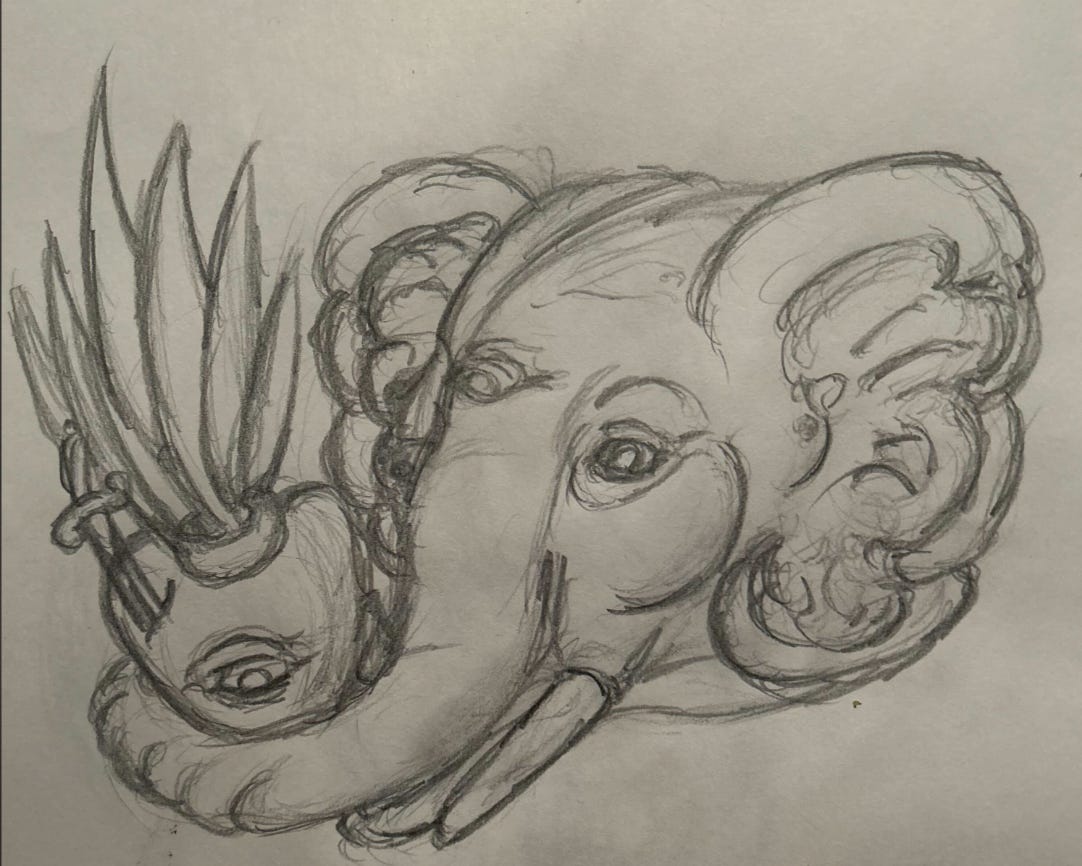Welcome to Weed Church. Let’s start with a Fudo I loved this week from Instagram:
This dude is one of the best doing it. Someone fly me to Taiwan or at least get me some emails of some folks :).
On to this week’s topic!
Math as Language
I find myself thinking of scale often, which is a function of my day job. I do research for various clients, which means that my job is to look at numbers — something relatively few people in the United States understand in a conceptual rather than pragmatic sense — and then tell the client what the numbers mean. Anyone can look at a chart and read, for example, that 20% of people feel a certain way. It takes a lot of data ingestion to read the chart and tell someone what is likely to happen as a result of those people feeling that way.
It’s all game theory stuff, though watered down to make it approachable to the layman. If 20% of people feel bad about their finances, for example, they are less likely to buy something expensive in the near future (even with the ease of access to free credit in this country). That this statement is true is a function of scale: it would be offensive at the individual level to presume someone’s purchases imply a level of status within a community. However, at scale — a function of probabilistic likelihood rather than material reality — it is scientifically accurate based on just about every consumer study ever conducted.
Thus the existence of “aspirational marketing,” meant to draw a consumer’s money exclusively based on what they want to be rather than what they are. Shows like Mad Men make this out to be a top-down phenomenon; we are mice in a cage manipulated by the moneyed and the markets. At scale, that seems true, and I’ve watched enough charts move with media investment to know it’s at least correlated if not the direct cause. Yet, it also always feels too absurd to be completely true; surely it’s just the repetition of the message triggering an existing desire rather than the creation of a new one. To even imagine the other possibility is to come face to face one’s confidence (or lack thereof) in their ability to discern free will from animal instinct.
The counter-evidence to the movement of the lines on the charts are the millions of people who resist the consumer economy’s vision of class and status, sometimes begrudgingly so. I doubt they would all agree on what it is that resist it for. Maybe it’s God for some, political ideology for others, lack of choice for even more. That’s what Pittsburgh feels like, sometimes. Living here is also a constant reminder that it could all disappear as fast as it’s built, thus the mostly tongue-in-cheek optimism in the region.
The Future is Irrational
“Fear, then, becomes the safety device with which the oppressed surround themselves in order to give some measure of protection from complete nervous collapse. How do they achieve this? In the first place, they make their bodies commit to memory ways of behaving that will tend to reduce their exposure to violence.”
-Howard Thurman, Jesus and the Disinherited
Covid brought scale into the forefront for people, whether they realize it or not. It’s been fascinating to watch it in the market research industry. The economy is still functioning as one would hope, but there are small behavioral changes that, at scale, become massive disruptions for otherwise entrenched industries (including market research’s own industry). Nothing seems settled, as attitudinal shifts and even stress levels seem to functionally impact the consumer economy, if only as railroad switches diverting the flow of disposable income.
That’s a form of Belief in and of itself; a faith in “free markets” that repetition yields scalable outcomes. As something like Covid shows, though, the foundation of that faith is shaken by the slightest ripple: a disease fatal to a small percentage at scale adds up to millions dead worldwide and countless others impacted — either spiritually via behavioral change or quite literally because of long Covid symptoms. Predictable outcomes at scale require stable inputs, which is something that the United States economy does not appear to have at the moment.
The rush to declare Coronavirus “over” is itself a form self-delusion, as if there will ever be a permanent repair to the cracks in the facade created by our ongoing catastrophe. That’s not good or bad. It’s just what stuff is going to be now. We’ll figure out how to work around it. It’s going to require some irrational thought, though. It’s going to require faith in something beyond ourselves. After human catastrophe, I just don’t know that humanism is going to cut it.
There’s no way to properly define “Belief” at a global scale, given that believers will all have their own individual esoteric definition of their relationship with the spirit of many names. Regardless, the vast majority of the global population maintain Belief in God of some kind. It would seem prudent, then, for the rationalist to remember that they are fighting against the current, even as they feel uniquely qualified to plan the direction of a society. Rationalism is not a majoritarian position.
That’s because the future is becoming an increasingly irrational concept. We replaced apocalyptic death cults of Western Christian fanatics with the rational belief in the science of a coming apocalypse brought on by the changing climate. Perhaps these are the limitations of the monotheistic imagination at work, but it seems like no matter which God you choose to kneel in front of these days, you’re likely to believe the End is fucking nigh. What difference does it make whether your neighbor is Pentecost or New Atheist: if both believe the world’s cooked, both are subject to the same fearful manipulation.
But if the end is unavoidable is it also not illusory? These apocalyptic visions are so inherently dualist, making fuss about the inevitable as though there are materially relevant ways of avoiding it. There is no end. Apocalypse, at scale, has always been imaginary because it implies that humanity has created Order from Chaos, an observably untrue statement. Order from Chaos is the natural state of the universe; a natural law like hunger and thirst that humanity is subject to rather than creator of.
Order from Chaos happens at the individual level through crisis of confidence and evolved consciousness. At scale and with time, that could work, but I fear we’re a bit too impatient to for the level of chaos that awaits.




